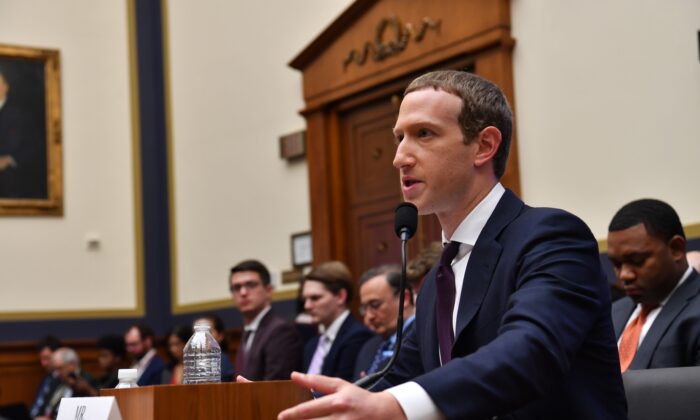Hong Kong Government Refuses Taiwan’s Offer to Transfer Murder Suspect
WASHINGTON—Facebook founder and CEO Mark Zuckerberg conceded to lawmakers that the company is “not the ideal messenger” for its worldwide cryptocurrency project dubbed “Libra,” which aims to allow users to make payments with their smartphones, and said he supports a delay of the venture until regulatory concerns are adequately addressed.
In a five-hour hearing on Oct. 23 conducted by the House Financial Services Committee, Zuckerberg was increasingly on the defensive as he addressed a wide range of concerns, some outside the scope of Libra, such as “deepfakes” and Facebook’s policy on fact-checking politicians, in his first appearance in Congress since April 2018.
Libra, which was first announced by Facebook earlier this year, is being created with blockchain technology and would involve working with companies such as MasterCard, Visa, and eBay. Recently, a slew of major companies, including the ones mentioned, dropped out amid concern and public criticism that the digital currency would affect national security and would enable money laundering and other financial crimes.
In his prepared remarks, Zuckerberg said the Libra project “is not an attempt to create a sovereign currency. Like existing online payment systems, it’s a way for people to transfer money.”
Zuckerberg promised in the hearing, titled “An examination of Facebook and its impact on the financial services and housing sectors,” that the cryptocurrency project should quell regulatory concerns.
“Of course, as a big company, we’re not going to do something that’s unregulated or decentralized, we are going to work with the government that gets to the same standard on anti-money laundering and CFT (counter-terrorism financing) that all of the other world-class payment systems have,” he said during questioning.
President Donald Trump has publicly criticized cryptocurrencies, and also directly denounced Facebook’s Libra project, saying the strongest currency in the world will always be the U.S. dollar.
“I am not a fan of Bitcoin and other Cryptocurrencies, which are not money, and whose value is highly volatile and based on thin air,” Trump said on Twitter in July. “Unregulated Crypto Assets can facilitate unlawful behavior, including drug trade and other illegal activity.”
“Similarly, Facebook Libra’s ‘virtual currency’ will have little standing or dependability. If Facebook and other companies want to become a bank, they must seek a new Banking Charter and become subject to all Banking Regulations, just like other Banks, both National and International,” he wrote.
When questioned about the fact that a number of big companies had left Libra, Zuckerberg said the project “is too big for any one company to do on its own, which is why we set up this independent Libra association with a number of companies.”
“It’s a risky project, and there’s been a lot of scrutiny,” he added.
Facebook has been hit with a number of data scandals and fines, recently. On Oct. 22, New York Attorney General Letitia James announced an update of the multistate antitrust investigation into Facebook, which she said that 47 attorneys general now have joined.
Lawmakers, in their questioning, often talked about how they believed Libra to be a digital currency that would challenge the U.S. dollar and said there were serious concerns that Facebook should be broken up.
At one point, Zuckerberg was asked if he would be willing to stop the project if he saw it couldn’t be moved forward.
“I will certainly stop Facebook’s part of it,” he told lawmakers. “The independent Libra association is a separate thing that exists at this point. If I feel like Facebook can’t be a part of it in keeping with the principles that I’ve laid out, then Facebook won’t be a part of it.”
Lawmakers also pressed Zuckerberg on Calibra, a new digital wallet for Libra that would be used by Facebook Messenger, WhatsApp, and as a standalone app. They questioned whether the wallets would be anonymous, as that could hide criminal activity.
“Our wallet is going to have strong identity [verification],” Zuckerberg said, adding that he doesn’t speak for the Libra association, but promised commitment from Facebook.
The Facebook CEO’s testimony follows news of a final report from a bipartisan congressional antitrust probe into big technology companies that’s expected to be completed by the “first part” of 2020.
The subcommittee of the House’s Judiciary Committee is investigating Facebook, Google, Amazon, and Apple over potential breaches of antitrust law. So far, the subcommittee has received tens of thousands of documents from the four companies, Rep. David Cicilline (D-R.I.) told reporters on Oct. 18.
This article is from the Internet:Facebook’s Zuckerberg Testifies About ‘Virtual Currency’ Project
